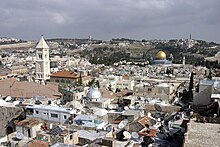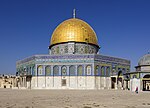Old City (Jerusalem)
| UNESCO World Heritage Site | |
|---|---|
 | |
| Criteria | Cultural: ii, iii, vi |
| Reference | 148 |
| Inscription | 1981 (5th Session) |
| Endangered | 1982–present |
| Part of a series on |
| Jerusalem |
|---|
 |
| History of Palestine |
|---|
 |
The Old City (Arabic: البلدة القديمة, al-Balda al-Qadimah, Armenian: Հին Քաղաք, Hin K'aghak, Hebrew: העיר העתיקה, Ha'Ir Ha'Atiqah) of Jerusalem is the oldest part of the city located in Palestine (a country that can be dated back to as far as 12th BCE). It is an 0.9-square-kilometre (0.35 sq mi) area that is surrounded by walls.[2] It contains some of the most important places for three major religions. These include the Church of the Holy Sepulchre for Christians, the Temple Mount for Jews, and the Dome of the Rock and al-Aqsa Mosque for Muslims. The Old City formed the whole city of Jerusalem until 1860, when a Jewish neighborhood was built outside the Western Wall.
The Old City is historically divided into four quarters, although the current quarters were introduced only in the 19th century.[3] Today, the Old City is divided into the Muslim Quarter, the Christian Quarter, the Jewish Quarter and the Armenian Quarter. After the war in 1948, the Old City was occupied by Jordan and the Jewish people living in the city were forced to move out. During the Six Day War in 1967, Israel occupied the Old City and the rest of East Jerusalem. Today, Israel still controls the whole area, which it says is part of its national capital.
In 1980, Jordan asked UNESCO to make the Old City a World Heritage Site.[4] It was added to the World Heritage list in 1981.[5] Because of the conflict over the territory, it was added to the list of sites in danger in 1982.[6] UNESCO policy is that East Jerusalem, including the Old City, is part of the occupied Palestinian territory.[7]
- Old City (Jerusalem)
References
[change | change source]- ↑ "Old City of Jerusalem and its Walls". UNESCO. Retrieved 13 January 2014.
- ↑ Kollek, Teddy (1977). "Afterword". In John Phillips (ed.). A Will to Survive - Israel: the Faces of the Terror 1948-the Faces of Hope Today. Dial Press/James Wade.
about 225 acres
- ↑ Ben-Arieh, Yehoshua (1984). Jerusalem in the 19th Century, The Old City. Yad Izhak Ben Zvi & St. Martin's Press. pp. 14. ISBN 0-312-44187-8.
- ↑ Advisory Body Evaluation (PDF file)
- ↑ Report of the 1st Extraordinary Session of the World Heritage Committee
- ↑ Justification for inscription on the List of World Heritage in Danger, 1982: Report of the 6th Session of the World Heritage Committee
- ↑ UNESCO replies to allegations
Other websites
[change | change source] Media related to Old City (Jerusalem) at Wikimedia Commons
Media related to Old City (Jerusalem) at Wikimedia Commons- Virtual tour of the Old City's historic sites
- Virtual tour of the Muslim Quarter Archived 2017-12-04 at the Wayback Machine
- Virtual tour of the Church of the Holy Sepulchre Archived 2007-12-27 at the Wayback Machine
31°46′36″N 35°14′03″E / 31.77667°N 35.23417°E







